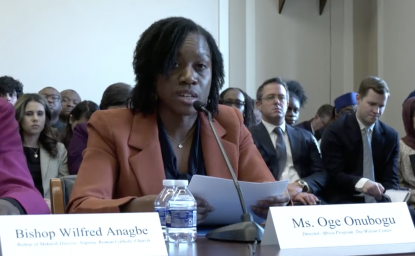A conference on March 2 that was co-hosted and organized by the Wilson Center's Africa Program underscored one of the most pressing and urgent problems that Africa faces: food security.
The issue of food security often gets overlooked by policymakers around the world as they concentrate on conflicts in such places as Somalia, Sudan, or the Democratic Republic of the Congo. It is a dimension often passed over as policymakers respond to humanitarian imperatives such as the HIV/AIDS pandemic, floods in northern Kenya, or drought and famine in a number of countries on the sub-continent, or, as they deal with illegal arms, and drug and human trafficking.
However important these other issues are, if food supplies in Africa cannot be assured, then Africa's future remains dismal, no matter how efforts of conflict resolution pan out or how sustained international humanitarian assistance becomes. It sounds sophomoric, but food is essential to population health and happiness—its very survival—but also to productivity and creativity. Without sustained food security in Africa, economic progress is severely hampered, conflict flash points are exacerbated, fragile states that threaten international security are incubated or sustained, and public health goals are unattainable.
If Africa and the world are looking forward to a better future, all the trade, investment, conflict resolution, peace building and development aid will be for naught unless food supplies are secured. This not only means a search for the next "Green Revolution," and increased agricultural productivity, but also: supporting of micro-finance; development of infrastructure in roads, irrigation, and processing; favorable marketing mechanisms and fair price structures; training, education and extension services; and stable governance which brings peace and security to the countryside in which farming takes place.

Africa Program
The Africa Program works to address the most critical issues facing Africa and US-Africa relations, build mutually beneficial US-Africa relations, and enhance knowledge and understanding about Africa in the United States. The Program achieves its mission through in-depth research and analyses, public discussion, working groups, and briefings that bring together policymakers, practitioners, and subject matter experts to analyze and offer practical options for tackling key challenges in Africa and in US-Africa relations. Read more

Explore More
Browse Insights & Analysis
Olufemi Vaughan: Shaping Governance Through Scholarship and Dialogue

How Do African Products Support US Consumers? African Suppliers, US Buyers, and New Markets

